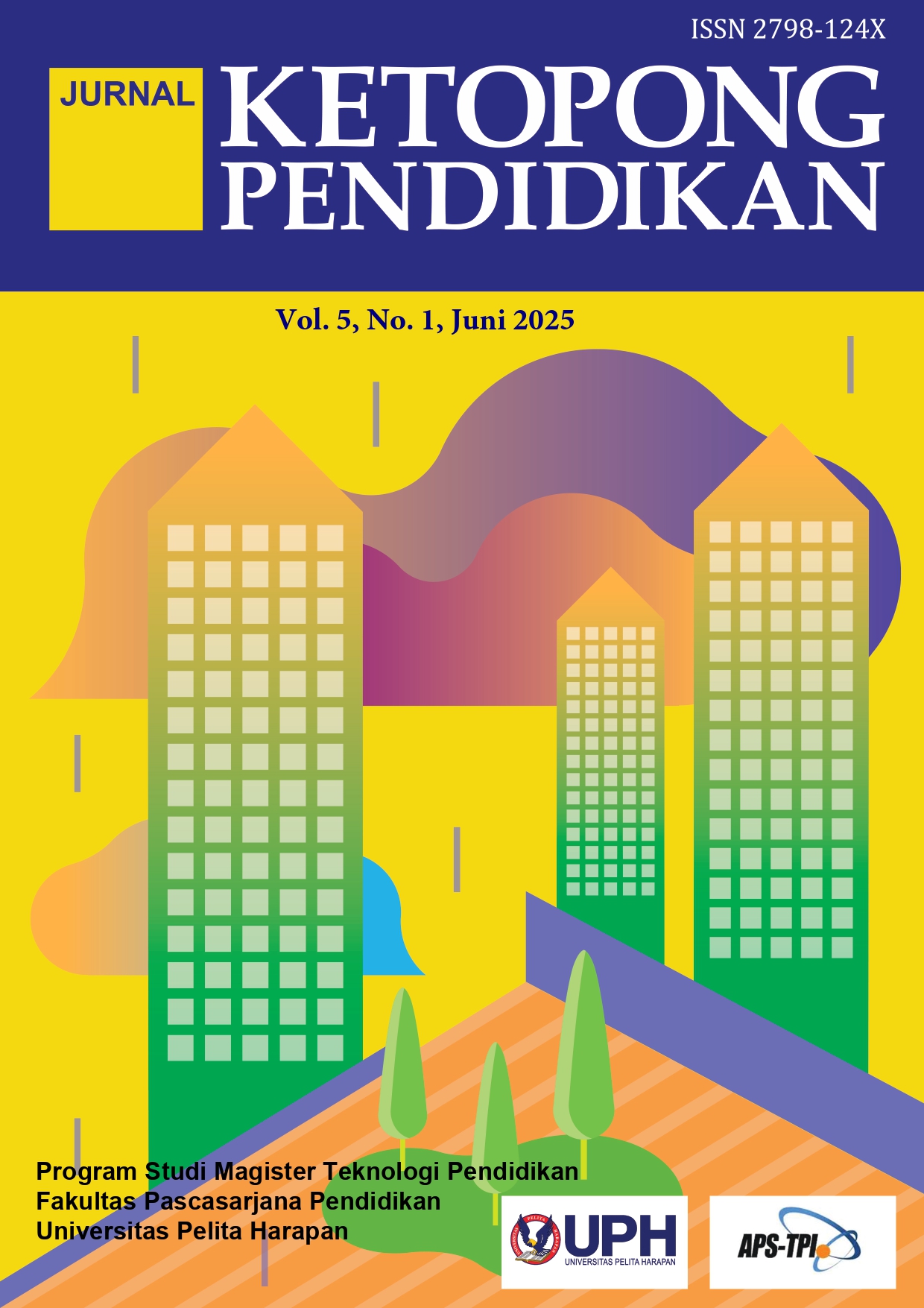Studi Kasus: Hubungan Kolaborasi dengan Perilaku Inovatif Guru di Sekolah XYZ [Case Study: The Relationship Between Collaboration and Teacher Innovative Behavior at XYZ School]
DOI:
https://doi.org/10.19166/jkp.v5i1.10209Schlagworte:
Collaboration, Innovation, Innovative Work, Behavior, Teacher, School , [Kolaborasi, Inovasi, Karya Inovatif, Perilaku, Guru, Sekolah]Abstract
Innovative work behaviour is important for teachers to develop and improve their work effectively. Collaboration is needed to be enhanced so that every teacher can work together to produce quality teaching and learning. The research was an explanatory case studies aims to determine the relationship of collaboration to teacher’s innovative work behaviour at XYZ school. The research was conducted in three days in the 2022/2023 academic year. A closed questionnaire with a four-point Likert scale was given to twenty-two teachers of XYZ school. Pearson’s correlation was used as a validity test Cronbach’s alpha was used as a reliability test and chi square technique was used as a normality test. The data analysis technique used is correlational quantitative data analysis using Spearman’s Correlation (rs). The research results indicate that there is a significant and positive relationship between collaboration and teacher’s innovative work behaviour. In conclusion, collaboration is needed for every teacher to develop their innovative work behaviours.
Literaturhinweise
Chomariyah, S. N., & Wahjono, S. I. (2022). Tim kerja di sekolah. Indonesia, Surabaya: Universitas Muhammadiyah Surabaya.
Colquitt, J. A., LePine, J. A., & Wesson, M. J. (2015). Organizatonal behavior - improving performance and commitment in the workplace (4th ed.). New York: Mc Graw Hill Education.
Hafizhah, Z. (2021). Inovasi pendidikan era revolusi industri 4.0. Seri Publikasi Pembelajaran, Inovasi Pendidikan, 1(2), 1−9. doi:https://doi.org/10.31219/osf.io/ag4ph
Hernandez, P. M., Lacruz, M. G., Tesan, A. C., Nebra, A. R., Beteta, J. L., & Estevan, M. L. (2022). The moderating role of teamwork engagement and teambuilding on the effect of teamwork competence as a predictor of innovation behaviors among university students. Environmental Research and Public Health, 19(9), 1−16. https://doi.org/10.3390/ijerph191912047
Ismiantari, F. D., & Mulyana, O. P. (2021). Perbedaan perilaku kerja inovatif pada guru ditinjau dari karakteristik sekolah. Character Jurnal Penelitian Psikologi, 8(6), 190−201. https://doi.org/10.26740/cjpp.v8i6.41530
Jalmo, T., Fitriyani, D., & Yolida, B. (2019). Penggunaan problem based learning untuk meningkatkan keterampilan kolaborasi dan berpikir tingkat tinggi. Jurnal Bioterdidik, 7(3), 77−87. https://jurnal.fkip.unila.ac.id/index.php/JBT/article/view/17480
Janssen, O. (2001). Fairness perceptions as a moderator in the curvilinear relationships between job demands, and job performance, and job satisfaction. Academy of Management Journal, 44(5), 1039−1050. https://doi.org/10.5465/3069447
Johari, A. B., Wahat, N. W., & Zaremohzzabieh, Z. (2021). Innovative work behavior among teachers in Malaysia: The effects of teamwork, principal support and humor. Asian Journal of University Education, 17(2), 72−84. http://dx.doi.org/10.24191/ajue.v17i2.13387
Kasmawati, Y. (2020). Peningkatan kompetensi melalui kolaborasi: Suatu tinjauan teoretis terhadap guru. Equilibrium: Jurnal Pendidikan, 8(2), 136−142. https://doi.org/10.26618/equilibrium.v8i2.3377
Rahmawati, S. N., & Supriyanto, A. (2020). Pentingnya kepemimpinan dan kerjasama tim dalam implementasi manajemen mutu terpadu. Jurnal Dinamika Manajemen Pendidikan, 5(1), 1−9. https://doi.org/10.26740/jdmp.v5n1.p1-9
Sallis, E. (2005). Total quality management in education (3rd ed.). London: Taylor & Francis e-library. https://doi.org/10.4324/9780203417010
Sarmanu. (2019). Dasar metodologi penelitian kuantitatif, kualitatif & statistika. Indonesia, Surabaya: Pusat Penerbitan dan Percetakan Universitas Airlangga.
Schmitz, P. L., Klink, M. R., Beausaert, S., Bijker, M., & Segers, M. (2020). When innovation in education works: Stimulating teachers' innovative work behaviour. International Journal of Training and Development, 24(2), 118−134. https://doi.org/10.1111/ijtd.12175
Sudibjo, N., & Prameswari, R. K. (2021). The effects of knowledge sharing and person–organization fit on the relationship between transformational leadership on innovative work behavior. Heliyon, 7(6), 1−8. https://doi.org/10.1016/j.heliyon.2021.e07334
Sudjud, W., Hidayat, R., & Wulandari, D. (2022). Peningkatan perilaku inovatif melalui penguatan team learning dan knowledge sharing. Jurnal Manajemen Pendidikan, 10(2), 82−87. https://journal.unpak.ac.id/index.php/JMP/article/view/6101
Downloads
Veröffentlicht
Ausgabe
Rubrik
Lizenz
Copyright (c) 2025 Dianne Finsenda Lika, Floriberta Endar Artika, Tan Triwanti

Dieses Werk steht unter der Lizenz Creative Commons Namensnennung - Weitergabe unter gleichen Bedingungen 4.0 International.
Authors who publish with this journal agree to the following terms:
1) Authors retain copyright and grant the journal right of first publication with the work simultaneously licensed under a Creative Commons Attribution License (CC-BY-SA 4.0) that allows others to share the work with an acknowledgement of the work's authorship and initial publication in this journal.
2) Authors are able to enter into separate, additional contractual arrangements for the non-exclusive distribution of the journal's published version of the work (e.g., post it to an institutional repository or publish it in a book), with an acknowledgement of its initial publication in this journal.
3) Authors are permitted and encouraged to post their work online (e.g., in institutional repositories or on their website). The final published PDF should be used and bibliographic details that credit the publication in this journal should be included.


